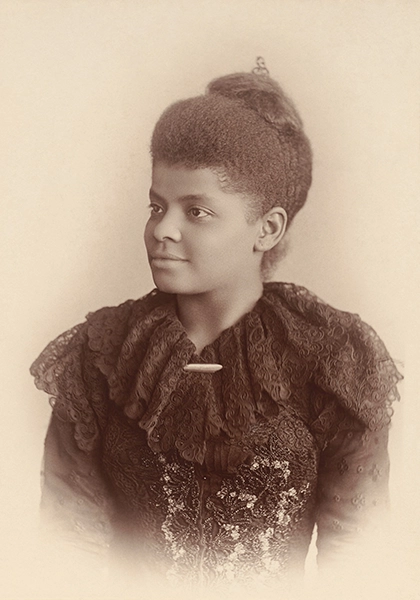Black Business News
Resistance: The Black Press Ida B. Wells-Barnett, Journalist, Publisher and Activist

By Jaylen Scott
Winter Intern
New Journal and Guide
Ida B. Wells-Barnett was a prominent African American journalist and activist. She played a big part in the anti-lynching campaign in America, with a goal to find the real reason behind the lynchings of African Americans in the Jim Crow South. Despite her life being in danger numerous times, Wells stepped up to the plate and showed true bravery as a Black journalist, speaking out about the injustices that Black People were going through during this time, so that everyone could be informed about the true nature of lynchings.
Wells was born on July 16, 1862 in Holly Springs, Mississippi, into slavery in the midst of the Civil War. She didn’t remember being enslaved due to being so young by the time the Civil war ended and slavery was abolished, but she has her parents’ stories and the marks on her mother’s back that allowed her to see the suffering that her parents and those like her experienced.
She was the eldest of 8 children and was born to James and Elizabeth Wells, who, after slavery was abolished, learned how to read and became politically active during the Reconstruction period, which took place during most of Ida’s childhood. Her parents made sure to instill the importance of education to all of their kids, and she even attended Rust college before she moved on to become a teacher at the age of 14. Two years later, she would unfortunately learn that her parents and her youngest brother both died of yellow fever. With the remaining siblings left orphaned, she and her siblings moved to Memphis, Tennessee, where she would take up a teaching job to help care for her family, as well as continue her own studies at Fisk University in Nashville.
During this time, Wells, at age 22, would start to experience the beginnings of the Jim Crow Era of the South. In 1884, Wells filed a lawsuit against the Chesapeake and Ohio Railroad company due to being kicked out of the first class train despite having bought a ticket. While winning her case, it was later revered in federal court, and 2 years later she would lose her teaching job after her contract wasn’t removed.
It was here that she would have her footing in journalism, writing a few newspapers artifices under the pen name “Iola” and going into journalism full time. This would be the start of her beginning of making Black History, becoming the first female co-owner and editor of a Black Newspaper in the U.S after she bought a share in the Memphis Free Speech and Headlight and was appointed as the editor.
In 1892, Well’s friend Thomas Moss, who was a Memphis letter carrier and grocer, was lynched by a white mob. The event caused Wells to urge Black people to leave Memphis for their own safety. It also caused Wells to focus her attention on the causes and reasons given for the lynchings in her area, leading her to investigate the true reasons for these lynchings.
She started to report her findings in the newspaper, and because of this, the residents of Memphis were enraged. A white mob ended up burning the press down, causing Wells and James Flemming, the co-owner of the newspaper, to flee Memphis. But this would not be the ending of her journalism career and activism— it was only the beginning of her anti-lynching campaign.
She would continue the anti-lynching campaign in New York taking a job with the New York Age as a staff writer and changing her pen name to “Exiled”. Wells would go on to document about 728 lynching cases in America that occurred between 1884 and 1892, going on to publish a pamphlet known as “Southern Horrors”, that 3 years later would be published as “The Red Record”.
Wells’ 100-page pamphlet contained a more detailed description of the lynchings happening in America, as well as a closer look at the struggles Black people had to go through after the civil war. She also would take her activism all across America, as well as outside of America, traveling around the country to speak about these cases, and even traveling to Great Britain to express these findings. During this time, Wells also married Ferdinand Lee Barnett on June 27, 1895, and had two children with him.
Wells would go on to accomplish more in her life as an activist, making history again when she became a founding member of the National Association for the Advancement of Colored People, also known as the NAACP. A year later, she founded and became the first president of the Negro Fellowship League and in 1913 she would go on to form what was possibly the first Black women’s suffrage group, Chicago’s Alpha Suffrage Club.
On March 25, 1931, Wells passed away to kidney disease in Chicago, Illinois. In 2020, she was posthumously awarded a Pulitzer Prize “for her outstanding and courageous reporting on the horrific and vicious violence against African Americans during the era of lynching.”
Ida B. Wells Barnett, in a photograph by Mary Garrity from c. 1893
You may like


Disbanding of TSU’s Board of Trustees: An “Attack On DEI”


Voting Rights Act Threatened –Again!


Beach NAACP Demands New Look At 2021 Police Shooting


“The Niagara Movement” Documentary On The Founding Of NAACP Is Now Streaming


VP Harris Speaks At Hampton University


“We March On”: Not A Commemoration, But A Continuation














